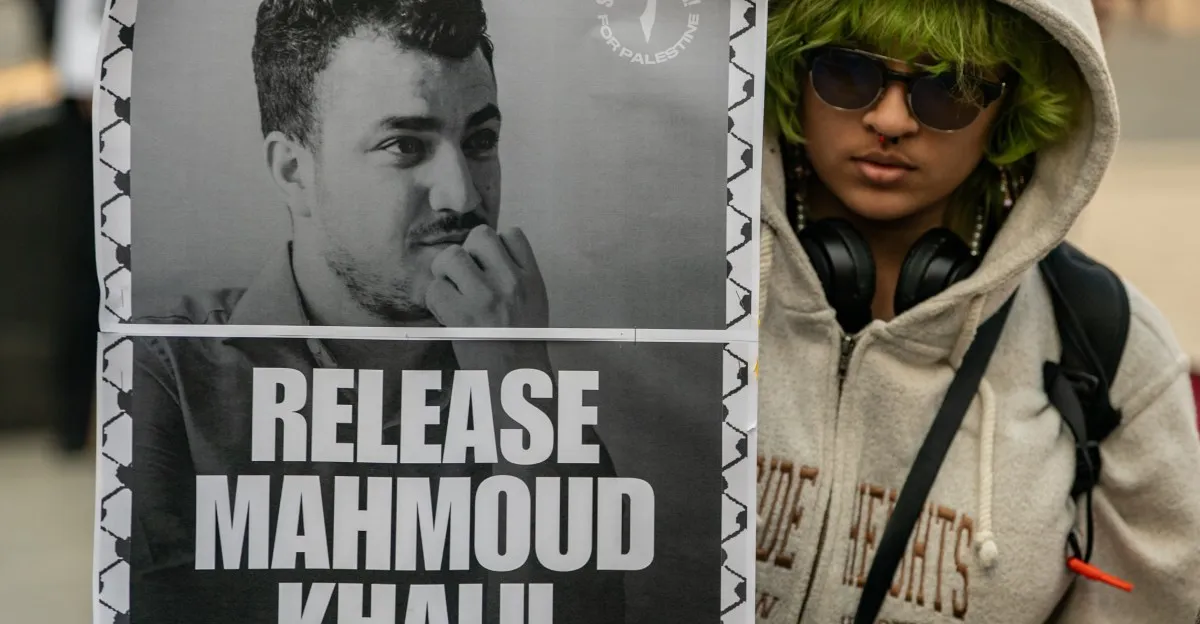
Civil rights advocates are expressing strong concerns over the Trump administration's recent actions, which they argue threaten First Amendment rights. This controversy arose following the arrest of Mahmoud Khalil, an immigrant involved in pro-Palestinian protests at Columbia University. Reports indicate that the U.S. Immigration and Customs Enforcement (ICE) detained Khalil at his university-owned apartment in Manhattan without explanation, leaving his pregnant U.S. citizen wife in distress.
On Saturday, ICE agents apprehended Khalil, later informing his attorney that they were revoking his green card due to alleged involvement in activities linked to Hamas. However, no formal charges were filed against him. This prompted a federal judge in New York to temporarily halt Khalil's deportation as his legal team prepares to contest the administration's actions. This case is poised to test the boundaries of First Amendment protections, particularly for noncitizen residents, while potentially impacting the rights of all Americans.
Legal experts warn that unless the government can substantiate its claims against Khalil with concrete evidence of any criminal conduct, this situation seems to reflect a troubling trend of punitive measures based on political expression. Will Creeley, the legal director for the Foundation for Individual Rights and Expression, stated, “The harm to First Amendment freedoms will be serious” if the government cannot provide evidence beyond mere disagreement with an individual's views.
Mahmoud Khalil’s situation raises significant questions regarding the Trump administration's authority to revoke his green card based on his participation in protests. On Sunday, Secretary of State Marco Rubio announced via social media that the administration plans to revoke visas and green cards of individuals supporting Hamas, yet no evidence has been presented to corroborate this claim regarding Khalil.
While the government does have the ability to detain and deport immigrants deemed “inadmissible” due to alleged ties to terrorism, civil rights attorneys argue that the administration's actions in Khalil's case may be an overreach. Ben Wizner, director of the American Civil Liberties Union's Speech, Privacy, and Technology Project, criticized the arrest as “unprecedented, illegal, and un-American.”
Under U.S. immigration law, the threshold for defining “terrorist activity” is notably high, encompassing serious crimes such as hijacking and assassination. Historically, the Trump administration had indicated that mere rhetoric would not suffice to meet this threshold. An internal memo from 2018 suggested that lawful permanent residents could not be removed merely for expressing support for terrorism.
In Khalil's case, the specifics surrounding his detention remain ambiguous, and the Department of Homeland Security has not clarified the grounds for his arrest. Khalil was actively involved in negotiations with the Columbia administration on behalf of pro-Palestine protesters at a Gaza solidarity encampment but did not partake in any violent actions.
The ramifications of Khalil's arrest are being felt across Columbia University, where students and faculty are concerned about potential repercussions for their political expressions. Michael Thaddeus, a mathematics professor at Columbia, emphasized that many faculty members, like Khalil, are permanent residents who have expressed views the Trump administration may find objectionable. “The attack on Mahmoud Khalil is intended to make them quake in their boots,” he stated, highlighting the chilling effect of this incident on academic freedom.
The implications of Khalil's arrest extend far beyond the university campus. The right to express opposition to the U.S. government's actions, including those related to the ongoing conflict in Gaza, is protected under the First Amendment, provided it does not involve criminal conduct. Legal experts emphasize that individuals have a right to fair hearings and due process, which Khalil appears to have been denied.
If this case sets a precedent for punitive actions based on political dissent, it raises concerns about the future of free expression in the United States, particularly among immigrants and potentially even American citizens. Creeley warned of a dangerous trend where the government interprets its powers expansively, possibly infringing upon the fundamental rights guaranteed by the Bill of Rights.